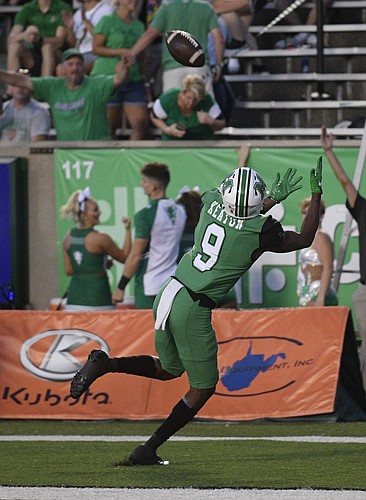- July 26, 2024
-
-
Loading

Loading

The floodgates are open.
At least, that's what some people feared when the NCAA's new Name, Image and Likeness rules went into effect July 1. As of that stroke of midnight, players in all college sports could make money off themselves. They couldn't be paid to play, but they could be paid to, say, promote the local chicken joint on Instagram or record a Cameo video for someone's birthday.
At least one Sarasota-area athlete has taken advantage. Former Booker High football wideout Talik Keaton, a rising sophomore at Marshall University, posted his first advertisement to his social media accounts on Tuesday: ads for Foreigner Clothing, with Keaton modeling the company's scorpion-emblazoned T-shirts. I haven't seen anyone else post an advertisement in this first week, but it's hard to keep track of everyone these days. I can say this with confidence: Keaton may be the first one to get paid through NIL laws, but he won't be the last.
People against the new NIL regulations argue that, while these laws themselves aren't harmful, they might pave a pathway to players getting paid to actually play college sports, or perhaps worse, creating a system where the top athletes in a given sport go to a small handful of schools whose boosters can pay them more to advertise than other school's boosters.
Personally, I wouldn't care if players were paid to actually play sports. No, things probably wouldn't be equal for everyone, but they're not equal in professional sports, either — or any other field — and NIL rights can level the playing field a bit. I often think about an Axios study from March which found that eight of the 10 most-followed college basketball athletes in the Elite Eight of the men's and women's basketball tournaments were women's players. The more followers you have, the higher your earning potential. In today's world, that means athletes in non-revenue sports can profit as long as they have social media savvy.
My favorite endorsement thus far? The University of Arkansas football team's entire offensive line being sponsored by Wright's BBQ, a local restaurant. They even used the hashtag "#BodyByBBQ" in their tweets. I mean, come on. That's beautiful. And it proves that you don't have to be a star quarterback to get on board.
NIL rights are also good news for fans of EA Sports' college football video game series. The relaunch of the game was announced in February. At the time, EA was unsure if the game would have the names of actual players in it when it launches (estimated to be in summer 2023). It's something EA Sports could never do before the game went into a hiatus in 2013, and a large part of the reason for that hiatus. After the NIL laws went into effect last week, the company put out a statement saying it would explore ways to obtain a group license for the name rights. I have a feeling they'll get it done.
Oh, and as far as the complaint that this may lead to a handful of schools dominating the recruiting game … they already do. Alabama and Ohio State have nearly 40% of all five-star players in the 2021 class. If anything, NIL may lead to talented players going elsewhere. A four-star wide receiver may be just another guy at 'Bama, but they could be the star of the whole team somewhere else, leading to more local sponsorship opportunities.
College sports are changing at a rapid pace. I would not be surprised if the NCAA itself ceases to exist within the next decade. Fans don't have to like it, but they should get used to it, maybe even embrace it a little. NIL laws are good for the growth of college sports, even non-revenue sports, and they let athletes, including ones we were lucky enough to watch in high school, have a bit more control over their careers.
As long as BBQ companies keep sponsoring the big boys on the front lines, I'm here for it.